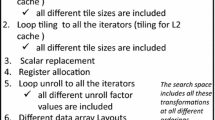Abstract
Many of compiler optimization techniques either reply on or can benefit from the timing information associated with each instruction and each variable in a given program. Using such information, in this paper, we develop an analytical approach that helps the parallelizing compiler to determine whether to spill a variable or not, which variable to spill and the places where spill code needs to be added, when a register is needed for a computation but all available registers are in use. The preliminary experimental results show that this new approach produces better object code.
Access this chapter
Tax calculation will be finalised at checkout
Purchases are for personal use only
Preview
Unable to display preview. Download preview PDF.
Similar content being viewed by others
References
T. Kiyohara and J. C. Gyllenhaal, “Code Scheduling for VLIW/Superscalar Processors with Limited Register Files”, Proc. of the 1992 International Symposium on Microarchitecture, pp.197–201, 1992.
D. Bernstein, D. Goldin, M. Golumbic, H. Krawczyk, Y. Mansour, I. Nahshon, and R. Pinter, “Spill code minimization techniques for optimizing compilers”, Proc. of the ACM SIGPLAN’89 Conf. Programming Languages Design and Implementation, pp. 258–263, 1989.
P. Briggs, K. Cooper, K. Kennedy, and L. Torczon, “Coloring heuristics for register allocation”, Proc. of the ACM SIGPLAN’89 Conf. Programming Languages Design and Implementation, pp. 275–284, 1989.
P. Briggs, K. Cooper, and L. Torczon, “Improvements to graph coloring register allocation”, ACM Trans. on Programming Languages and Systems, vol. 16,no. 3, pp. 428–455, May 1994.
D. G. Bradlee, S. J. Eggers, and R. R. Henry, “Integrating Register Allocation and Instruction Scheduling for RISCs,“ Proc. Fourth International Conference on Architectural Support for Programming Languages and Operating Systems, pp. 122–131, 1991.
S. S. Pinter, “Register Allocation with Instruction Scheduling: a New Approach, Proc. the SIGPLAN’93 Conference on Programming Language Design and Implementation, 1993.
C. Norris, and L. L. Pollock, “A Scheduler-Sensitive Global Register Allocator,” Proc. Supercomputing’93, pp. 804–813, 1993.
J. Wang, A. Krall, M. A. Ertl and C. Eisenbeis, “Software Pipelining with Register Allocation and Spilling,” Proc. of the 1994 International Symposium on Microarchitecture, pp. 95–99, 1994.
J. Llosa, M. Valero and E. Ayguade, “Heuristic for Register-constrained Software Pipelining,” Proc. of the 1996 International Symposium on Microarchitecture, pp. 250–261, 1996.
B. Natarajan, and M. Schlansker, “Spill-Free Scheduling of Basic Blocks,” Proc. the 28th International Symposium on Microarchitecture, pp. 119–124, 1995.
G. Lowney et al., “The Multiflow Trace Scheduling Compiler,” J. of Supercomputing, vol. 7, pp. 51–142, 1993.
J. A. Fisher, “Trace Scheduling: A Technique for Global Microcode Compaction,” IEEE Trans. on Comput., vol. C-30,no.7, pp. 478–490, 1981.
J. Ellis, “Bulldog: A Compiler for VLIW Architectures,” The MIT Press, Cambridge, Mass., 1986.
M. Y. Wu and D. Gajski, “Hypertool: A Programming Aid for Message-Passing Systems,” IEEE Trans. on Parallel and Distributed Systems, vol.1,no. 3, pp. 101–119, 1990.
E. B. Fernandez and B. Bussell,“Bounds on the Number of Processors and Time for Multiprocessor Optimal Schedules,” IEEE Trans. on Comput., Vol.C-22,No. 8, pp.745–751, 1973.
Author information
Authors and Affiliations
Editor information
Editors and Affiliations
Rights and permissions
Copyright information
© 1999 Springer-Verlag Berlin Heidelberg
About this paper
Cite this paper
Li, D., Iwahori, Y., Hayashi, T., Ishii, N. (1999). A Spill Code Placement Framework for Code Scheduling. In: Chatterjee, S., et al. Languages and Compilers for Parallel Computing. LCPC 1998. Lecture Notes in Computer Science, vol 1656. Springer, Berlin, Heidelberg. https://doi.org/10.1007/3-540-48319-5_17
Download citation
DOI: https://doi.org/10.1007/3-540-48319-5_17
Published:
Publisher Name: Springer, Berlin, Heidelberg
Print ISBN: 978-3-540-66426-0
Online ISBN: 978-3-540-48319-9
eBook Packages: Springer Book Archive




